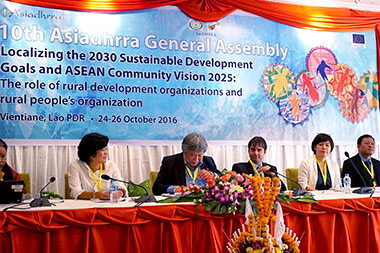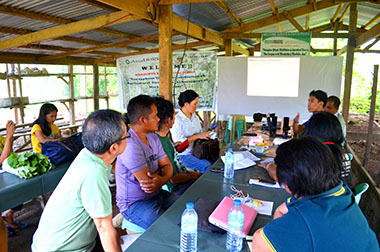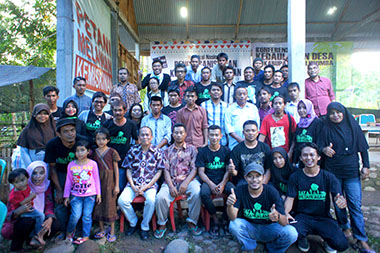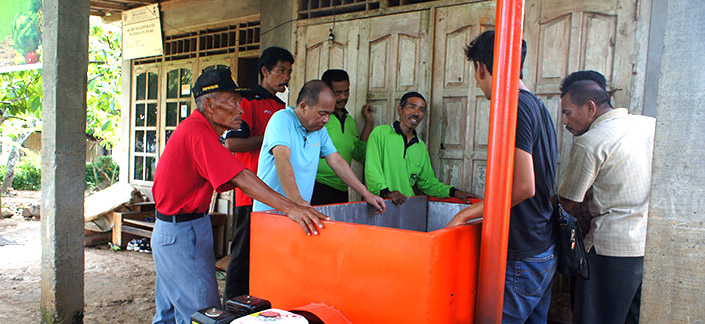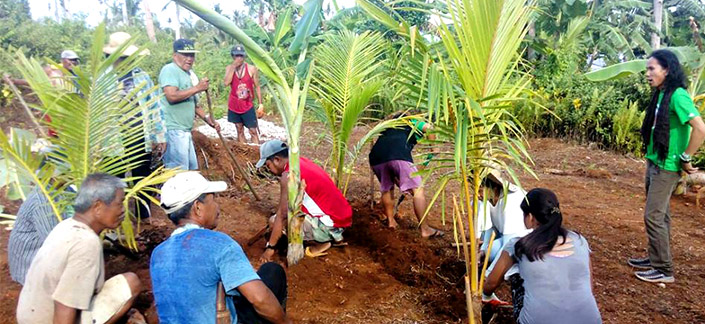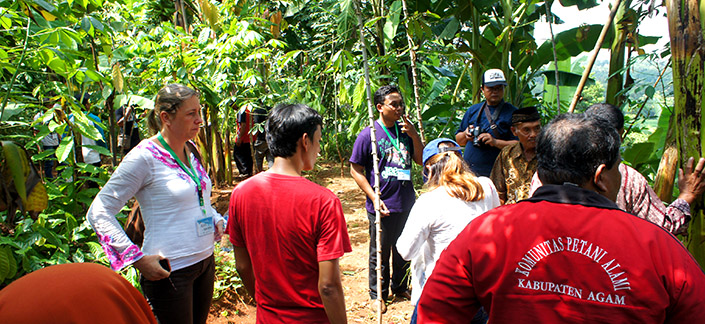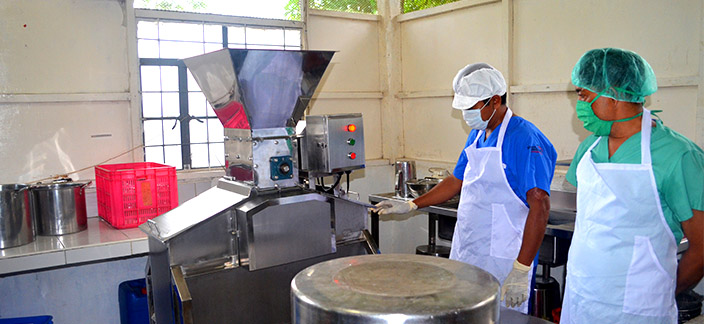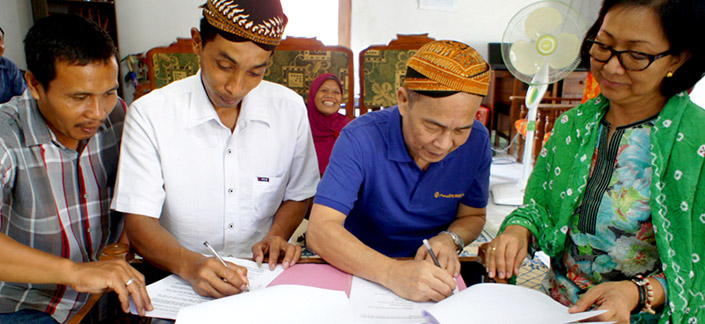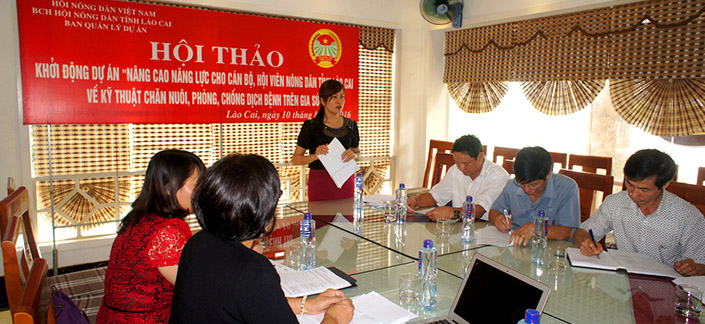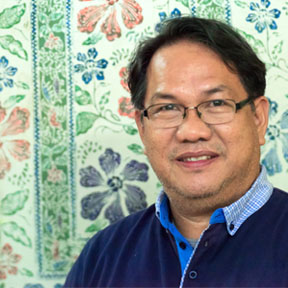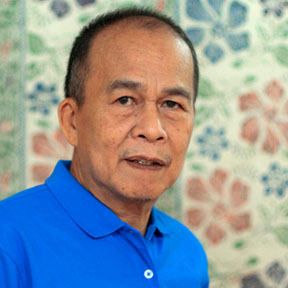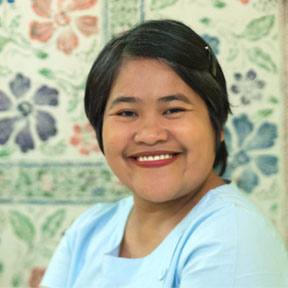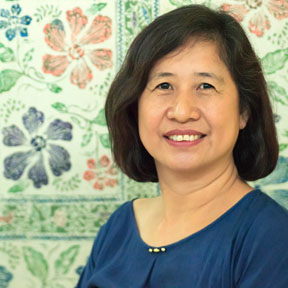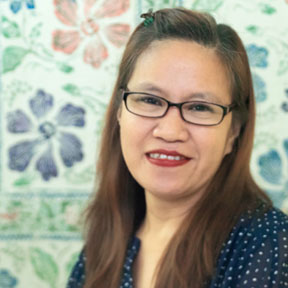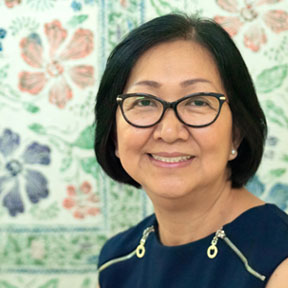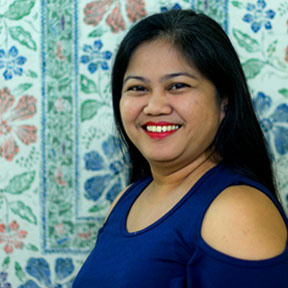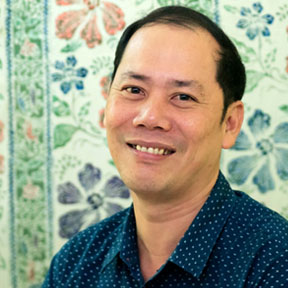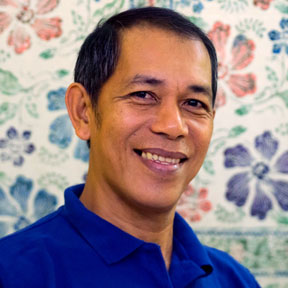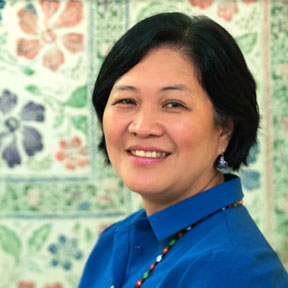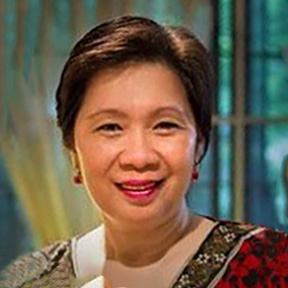Message from the Chairperson
Dwi Astuti (Binadesa) Asiadhrra Chairperson
wo years ago, AsiaDHRRA turned 40. We take pride not only for the work of our pioneers who taught us the value of musyawarah, of dialogues and consensus, of people-to-people learning and solidarity; but, also for our work in building capacities on rural and agricultural development work. But, still, we need to be continuously inspired and encouraged because our experiences, tools, and, skills are never enough as we face new challenges brought about by the fast global changes that bring both negative and positive impacts in the lives of rural people and communities.
It is good that we are able to stay focused on our work and conviction that rural peoples organizations have a significant role in combatting poverty and in developing agriculture and rural communities. In the recent years, we added and placed equal importance of market empowerment as an integral part of our priorities of strengthening rural peoples organizations’ voices and participation in local governance and policy decision-making.
On March 2016, the European Commission, through the Framework Partnership Agreement (FPA), recognized AsiaDHRRA as a regional network of rural development NGOs and agri-agencies that is capable of influencing governance processes and results that will contribute to the achievement of the UN Sustainable Development Goals (Goals), in particular the unleashing of human resource potentials in rural areas which is imperative to sustainable rural development and the strengthening of multi-stakeholder partnerships necessary for inclusive and equitable development and growth.
Through this FPA, AsiaDHRRA was able to access financing from EU for the Regional Cooperation to Empower Rural Development Organizations in Asia (ReCoERDO-Asia) to implement AsiaDHRRA’s strategic plan until 2019. ReCoERDO provides opportunities and resources for us to enhance our capacities in providing better, relevant, and, quality services to our partner communities. AsiaDHRRA’s membership to the AgriCord global alliance has significantly enhanced the network’s capacities to provide financing, advising, and, accompanying support to rural people’s organisations in the communities that we serve.
ReCoERDO will complement this, and we are excited and optimistic of what these solid programming will bring to our work in the coming years. Please share our inspiration as you read our biennal report. To date, we are supporting more than 30 rural peoples organizations with an outreach of 11,795 households in the Asean region; and, for this we have modestly mobilized Euro 4.88 for the programming period of 2015-2018.
This report celebrates the positive changes that farmers’ organizations and the AsiaDHRRA network have done together. We invite you to visit them in their communities and hear from their own words how their lives have been changed. In Indonesia, we have accompanied cacao farmers who were not able to maximize the benefits of the increasing market prices of cacao because the productivity of their old cacao trees have declined significantly and/or because of years of neglect because prices of cacao beans have not been encouraging. Now, the members of the organization are happy that they have improved productivity by rehabilitating and rejuvinating standing cacao trees, while starting to replant without necessarily disrupting cash inflows from cacao production.
We also witnessed how farmers in Lao PDR, Philippines, Indonesia and Myanmar have changed their rice and vegetable production systems by moving away from the conventional, high-cost, external input-dependent and health-risk production system to low-cost, environmentally sound sustainable production system. And, because of this, collectively their members are moving into new niche markets of organic, naturally grown, safe and healthy agricultural products.; and of farmers in Vietnam who have significantly reduced annual deaths of livestock animals due to climate change that brings about extreme cold weather during winter time. All of these are our modest endeavors that were able to make significant returns to the communities that have been served by our partner farmers organizations, in partnership with our member DHRRAs.
We hope this report will convey the dynamism and commitment of the rural communities that we work with women and men and compel us to advance our efforts, to do more and better in the coming years. We thank every organization who journeyed with us in the spirit of solidarity and cooperation.
Our Milestones
eginning 2015, AsiaDHRRA operations was guided by its new Strategic Plan 2015-2020 that was sanctioned by its General Assembly in October 2014. With the full support and participation of its DHRRA members and leaders, a dynamic secretariat, and with adequate resources mobilized to translate plans into actual cooperation, we are happy to share the results of our work. These contribute to our goal of improving the socio-economic well-being of organized farmers, fishers, rural women and youth, and indigenous peoples in Southeast Asian region. It is also our contribution to the realization of the UN Sustainable Development Goals 2030.
Stronger AsiaDHRRA network providing services to rural people’s organization
Backed up by its new Strategic Plan 2015-2020, AsiaDHRRA’s role as governance actor in the region was concretely recognized through the Framework Partnership Agreement (FPA) 2016-2020 with the European Commission.Backed up by its new Strategic Plan 2015-2020, AsiaDHRRA’s role as governance actor in the region was concretely recognized through the Framework Partnership Agreement (FPA) 2016-2020 with the European Commission.
Under the FPA, AsiaDHRRA was awarded a four (4)-year action grant, entitled: “Regional Cooperation to Empower Rural Development Organizations in Asia (ReCoERDO),” amounting to EU 3.01 million. ReCoERDO-Asia will fuel substantially the operationalization of AsiaDHRRA’s Strategic Plan in the next four years and of the DHRRAs in Philippines, Laos, Indonesia, Myanmar, Vietnam, Malaysia, Cambodia, and, Thailand.
AsiaDHRRA supported AgriCord to successfully mobilize funds for the FFP in the Asean region. Through the EU-IFAD funded ASEAN FO Support Program-FFP (2015-2019) with AgriCord, AsiaDHRRA mobilized funds to respond to demands of partner FOs for project cooperation and was able to engage national DHRRAs as support agri-agencies.
A cross-cutting milestone is AsiaDHRRA’s advancement of its engagement with ASEAN through the official partnership with SOM-RDPE geared to strengthen implementation of the RDPE Framework Action Plan 2016-2020. The partnership should result to more tangible results in the engagement at the national and local levels of DHRRAs and RPO partners. It is a strategic leverage to AsiaDHRRA’s regional cooperation around the issues of agriculture and rural development in favor of smallholder agriculture and family farming and climate resilient rural communities.
CSOs and RPOs effectively engaged in and benefiting from public and private programs
AsiaDHRRA sustained its commitment to an inclusive, broad-based, and effective participation of CSOs in policy engagement at the regiona level. It co-convened, on behalf of the Ad Hoc Committee for CSO-FAO Engagement (AHC), the CSO Consultation in conjunction with the 33rd FAO Asia Pacific Regional Conference (APRC) in March 2016; co-organized the 2015 and 2016 CSO Fora on Engaging the ASEAN Ministry for Agriculture and Forestry (AMAF), and the 6th ASEAN Cooperative Busines Forum in November 2016, amongst others.
AsiaDHRRA supported regional Knowledge Management activities among farmers’ organizations and agri-agencies such as the Workshop on FO Engagement in Public Programs and the Consultation-Workshop on Farmers Access to Seeds in August 2016 that contributed to building capacity of FOs in engaging public programs.
AsiaDHRRA supported Networking and Platform Building initiatives of farmers’ organizations in Laos, Philippines, and, Indonesia through conduct of policy study, learning visits, and, knowledge exchange workshops that strengthened their voices before policy makers, donors, and other development stakeholders.
More specifically, it has financed FOs in their engagement of government programs related to the recovery of the Coconut Levy Fund (Phils) and the participation in the Lao Global Agriculture and Food Security Program (GAFSP) project.
Stronger Rural People’s Organizations (RPOs)
AsiaDHRRA, in coordination with national DHRRAs, has supported thirty (30) rural people’s organizations, targetting 36,780 households until 2019, currently reaching at least 11,795 households in 18 provinces in 6 Asean countries.
From 2015 to date, we have mobilized a total of Euro 3.8 million to support the Farmers’ Fighting Program (FFP) programming until 2019; this , includes Euro .580 million under the Post Haiyan Fund for Local Associations.
The support of AsiaDHRRA to rural people’s organizations, in partnership with the national DHRRAs and CSO partners, contributed to their organizational and institutional development, policy advocacy, and especially to their economic empowerment through value-chain based enterprises.
Highlights of 2015-16 Accomplishments
Stronger Rural People’s Organizations (RPOs):
In coordination with national DHRRAs, we supported thirty (30) RPOs, targetting 36,780 households until 2019, currently reaching at least 11,795 households in 18 provinces in eight (8) ASEAN countries. RPO projects are largely focused on their economic activities. Support for these RPOS come from three (3) sources, namely a) Farmers Fighting Poverty Program (FFP) under AgriCord, b) the Post-Haiyan Fund Facility for Local Initiatives from grants of Fondacion de France and AgriCord, and, c) Regional Cooperation to Empower Rural Development Organizations in Asia (ReCoERDO-Asia).
From 2015 to date, we have mobilized a total of Euro 3.2 million to support FFP programming until 2019. Commitment to FO partners is at least three years subject to annual review. In the AgriCord Alliance, AsiaDHRRA takes lead role in the implementation of the FFP programming, in particular under the FFP-ASEAN which is a component of a Euro 15 million EU-IFAD funded cooperation called ASEAN Farmers’ Strengthening Support Program (AFOSP). The other component of AFOSP is managed by AFA, the strategic regional FO partner of AsiaDHRRA. For the Post Haiyan Facility, Euro 0.58 million, was mobilized to support 15 local farmers and fishers organizations.
The support of AsiaDHRRA to RPOs, in partnership with the national DHRRAs and some NGOs, is mainly on capacity building both in the area of economic work, which also directly affects organizational leadership and management, institutional development and policy advocacy at the local levels. Specific strategies being employed including strengthening RPOs position in the agricultural value chain of specific commodity but cuts across RPO governance, transparent and accountable leadership, financial management, improvements and strengthening of their services to their members especially involving agricultural training extension and rural advisory.
The approach of AsiaDHRRA under the FFP program is to support RPOs directly. This scheme, specifically give RPO the direct management of funds and provide them that opportunity to manage and experience fund management. This experience is expected to significantly build confidence and competence of the RPOs in project and financial management. Through this scheme, they are able to identify their own problems, define concrete solutions, and, implement and manage the projects according to their level of capacities. The DHRRAs and other NGOs provide technical support and accompaniment to the RPOs in areas of project implementation where they need help.
AsiaDHRRA also supported 28 farmer-to-farmer learning exchange activities, participated by at least 512 farmer-leaders at the national and inter-country level, where beginner RPOs visit more advanced RPOs and learn from them how services are being organized and delivered to the members. These exchanges focus on themes such as production, processing, and marketing of certain commodities such as organic rice, cacao, coffee, and various horticultural products.
Another project co-implemented with MyanDHRRA, entitled “Preparing the Grounds for the Growth, Development and Strengthening of FOs in Myanmar,” has served to raise awareness on the importance of farmers’ organizations role in rural development. It has inspired and contributed in the process of documentation of farmers’ groups and associations in the country which serves as basis in the continuing engagement with policy makers and the development community in support of smallholder agriculture.
In the implementation of these programs/fund facilities and projects directly supporting RPOs, some of the emerging indicators demonstrating the growing capacity of the RPOs are the following:1.7 In the implementation of these programs/fund facilities and projects directly supporting RPOs, some of the emerging indicators demonstrating the growing capacity of the RPOs are the following:
Improved productivity and catalyzed RPO enterprises and linkages to markets. Improved productivity means increased yields as well as shifting to market-oriented production of some specific agricultural commodities to comply with market requirements of volume, food safety, product quality and delivery schedules. Through training workshops, farmer-field schools and field demonstrations, the RPOs have learned to plan their farms and employ new production techniques. They began to intensify and diversify their farms which resulted to more and varied food crops contributing to their household food security and, in increasing cases, improvement of cash flow. In some commodities, processing were developed and market outlets were identified via their local market, new marketing scheme (e.g. selling in schools), and opening of business stalls. However, business enterprises will have to be improved in terms of profitability which involved economy of scale and cost management. In the last two (2) years, AsiaDHRRA has supported conduct and publication of three (3) value chain studies in organic rice, one (1) in modified cassava flour (mocaf), one (1) in seaweed, and, one (1) in swine. AsiadDHRRA’s support also pushed RPOs in establishing direct market linkages involving coffee, cacao, organic rice, vegetables, calamansi, among others.
Improved leadership and organizational management. RPOs direct implementation of their own economic work has significantly influenced improvements in RPO leadership and management processes. RPO economic work demands basic values of transparency and accountability. This is manifested through conduct of regular and special meetings, including special caucuses, more systematic financial recording, and, timely submission of both project and organizational progress and financial reports. Assigned committees and cluster leaders had demonstrated leadership as well through operationalization of their assigned functions. Gender awareness has enhanced, too, with the increasing number of women leaders and members now. Key leaders have demonstrated improvement in terms of public speaking and facilitating organizational meetings and other related activities.
Improved provision of RPOs’ relevant services to its members. The training and development of more than 2,000 Farmer Technicians, Farmer Field School Facilitators and Farmer Agri-Extensionists has increased coverage of agriculture training and extension members. This was accomplished with the support from their technical partners (DHRRA, National Federation/Network of RPOs, or NGOs), which provided technical know-how to members on various farm techniques such as production of organic fertilizers and various ways to improve soil fertility, plant nutrition, disease prevention and pest management. Through AsiaDHRRA’s financial support, RPOs were able to provide their members services to access farm tools, seeds/seedlings and planting materials, start-up animals, fishing boats and fishing gears, and agricultural machines such as rice threshers, power tiller, harvesters and processing equipment such as sieves, cassava chippers, mechanical dryers, grinders, coffee pulper and dehuller, roasting machine, moisture meters, fermentation boxes, among others. There are also success cases where RPOs were able to access financial seed capital and farm machineries and processing equipment from government or NGO programs such as mud tillers, harvesters and rice threshers, flour mills, solar dryers, and others. Through this access to farm inputs, the RPOs were able to provide services to their members in improving tillage and minimizing losses; at the same time, generate revenues by collecting users fees from members.
Member of RPOs were provided inputs towards resiliency to climate-related risks. This is more pronounced in the Post-Haiyan (Yolanda) Fund for Local Initiatives. Local communities were given orientation regarding climate change and disaster risk management. Consultations and dialogues at the local, regional and national levels were organized to promote the important role of RPOs (and their communities) in disaster risk reduction and management. RPOs are finding doable approaches to improve the resiliency of he household and their farms from natural disasters, including linkaging and participation in government DRR programs. The importance of promoting sustainable farming system as imperative for climate resilience was highlighted in the Post Yolanda work by investing in the Integrated Diversified Farming Systems (IDFOS) approach introduced by PAKISAMA. It also gave importance in the capacity building and organizing of agriculture extension workers from among the FOs, especially young people.
In this whole process of supporting the RPOs, it is important to emphasize that the role of the member DHRRAs (e.g. InDHRRA, MyanDHRRA, PhilDHRRA, LaoDHRRA) is very critical. DHRRAs and other NGOs must provide an effective support to RPOs through accompaniment. Accompaniment is not doing things in behalf of the RPOs but supporting them and providing them advisory in their decision-making, in their own management processes and in implementing decisions that they themselves made. More importantly, this must be on demand basis of the RPOs, according to their own assessment and analysis of their situation.
FAKZ Laos
Farmer members of the FAKZ Laos
An Giang Palm Sugar Producers
Meeting of the An Giang Palm Sugar Producers
FASAP Laos
Meeting of the Farmer members of the FASAP Laos
Coop KSUKPA
Meeting of the Farmer members of the KPA-Coop KSUKPA
FOPPS
Meeting of the FOPPS
KSPS
Members of the KSPS
KTLFA-Myanmar
Farmer members of the KTLFA-Myanmar
Lao Cai Farmers Union
A farmer member of the Lao Cai Farmers Union
Ngudi Makmur Coop
Farmer members of the Ngudi Makmur Coop attend a training seminar
Ngudi Mulyo
Farmer members of the Ngudi Mulyo
CSOs and RPOs effectively engaged in and benefiting from public and private programs
Phuc Than Farmers Coop
Phuc Than Farmers Coop and Asiadhrra sign partnership agreement
AgriCord
Visit of AgriCord President
KLM-PE0
KLM-PEO
Post-Yolanda-Activities
Post-Yolanda-Activities
ReCoERDO-Asia
ReCoERDO-Asia
ReCoERDO-Asia
ReCoERDO-Asia
TrainingESFMBP
TrainingESFMBP
AsiaDHRRA continues to achieve results from its active engagement with regional and global policy making-bodies. In relation to ASEAN, beginning 2015, it has been invited to sit in the Coordinating Conference of the ASEAN Socio-Cultural Community (SOC-COM) which has the mandate of strengthening cross-sectoral and cross-pillar coordination and multi-stakeholdership processes in ASEAN. AsiaDHRRA was able to put forward recommendations to the ASEAN Community Vision 2015 and the ASCC Blueprint, in particular, its agenda related to rural development and poverty eradication. The RDPE 2015-2020 Framework Action Plan is relevant to the work of AsiaDHRRA in the region and at national levels, and is now subject to a Convergence Partnership for more effective engagement with national rural development agencies and their public programs.
As the focal organization of the CSO AdHoc Committee for FAO-Asia Pacific Regional Consultation, AsiaDHRRA, together with DHRRA Malaysia, co-organized the “CSO Consultation in conjunction with the 33rd FAO Asia Pacific Regional Conference (APRC)” on 5-6 March 2016. It was participated by at least 50 delegates, representing FOs and CSOs, from at least 17 countries in Asia and the Pacific. Key to AsiaDHRRA’s role as CSO interlocutor is its commitment to an inclusive, broad-based, and well organized participation of CSOs coming from diverse background and orientation, yet sharing common agenda vis FAO. CSOs in the last APRC were credited to have effectively raised the issues of smallholder food producers and have reflected a strong Asian civil society constituency capable of constructive engagement with policy makers. AsiaDHRRA, as regional focal point for CSO-FAO engagement, has also established the importance of follow through action in between biennial conferences on the recommendations around the conference themes e.g. agricultural investment, market empowerment, food safety, aqua culture, and agro-ecology.
AsiaDHRRA served as Resource Person in several regional fora such as the Policy Dialogue on the Role of Technology Transfer in Agriculture for Sustainable Development Outcomes” on February 2015 by SATNET, the 2016 Food Security Forum hosted by ADB, and the 2016 Grow Asia Forum in conjunction with the World Economic Forum in Southeast Asia in Kuala Lumpur. It is also part of the Facilitation Group that recently established the Asia Civil Society Partnership for Sustainable Development (ACSPSD) to enhance coordination and complementation of civil society initiatives revolving around the UN SDG30.
In the past two years, AsiaDHRRA has facilitated and contributed to the participation of CSOs in various regional and national platforms and processes such as in the FAO regional forum on Food Waste conducted July 2015 in Bangkok; the 37th ASEAN Ministerial Meeting in Agriculture and Forestry (AMAF) on September 2015 in Manila, whereby CSOs sustained their long time advocacy of an institutionalized mechanism for dialogue within the system of AMAF, and in the OECD-FAO-ASEAN Regional Conference on “Policies to Enable Food Security, Agricultural Productivity and Improved Nutrition” in June 2016 in Naypyidaw which successfully affirmed the call for multi-stakeholder process that recognize the role of FOs, rural peoples’ organizations, and NGOs.
In 2016, AsiaDHRRA co-organize the 6th ASEAN Cooperative Business Forum, with the theme “Enhancing ASEAN Economic Collaboration through Cooperative”, which gathered aroung 135 agri-cooperative leaders in the region and neighboring countries. It was followed by a post-ACBF planning-workshop with the theme “ASEAN Farmers Priorities, Strategies, Actions for Strengthening Agricultural Cooperatives in Asia” that was participated by aroubd 77 farmer leaders and development partners in the region. Results of the said workshops will serve as input for the ASEAN Working Group on Agricultural Cooperative (ASWGAC) towards the formulation of ASEAN Roadmap on Agricultural Cooperatives, and identify areas and action points for coop-to-coop and other stakeholders’ collaboration.
Public Program Engagement
AsiaDHRRA supported the networking initiatives of national and sub-national RPO platforms, such as the national consultation towards the meaningful participation of Lao farmers in designing the Global Agriculture and Food Security Program (GAFSP) in Lao PDR; the involvement of Indonesian Farmers’ Forum in peatlands cooperations with support from the EU; and PAKISAMA in accessing the Coco Levy Fund and the Post Yolanda Rehabilitation Program of the Philippine government. AsiaDHRRA is now financing and supporting the Lao Farmers’ Network (LFN) and PAKISAMA in their continued engagement in the implementation of the aforementioned public programs. AsiaDHRRA also supports PAKISAMA, through PhilDHRRA, on its effort to connect with other agri-cooperative stakeholders towards the establishment of a national federation of agri-cooperatives in the country.
A regional knowledge exchange workshop on FO engagement in public programs was conducted in August 2016 in Vietnam with the objectives of facilitating south-south learning exchange among FOs participating in public agricultural development programs. Participants from eight (8) National FOs from Southeast Asia, South Asia, East Asia, and Central Asia, recognized the need for continued capacity development of FOs to transform themselves from mere beneficiaries to service providers or partner or implementers of public programs. This was followed by a regional consultation on access to seeds in South and Southeast Asia aimed at identifying opportunities and challenges in seeds supply chain, social infrastructure, financing, and enabling mechanisms to empower smallholders in developing their own seeds enterprises for economic growth and more sustainable farming system.
In the Philippines, the organized FOs under the Post-Yolanda Projects had been consolidated into a sub-national Region 8 FO Alliance (R8), and had started the process of establishing an agricultural cooperative to help FOs achieve economic objectives, which they could not attain effectively if done through individual local associations. It will start to develop a saving and lending program to its members and establish collective mechanisms to provide services to farmer members in the area of production, processing and marketing of agricultural commodities – initially for seaweed, vegetables and swine products. The R8 will continue to serve as a platform for the FOs to engage constructively the local governments and national agencies for better lobby in policy making and access to public programs.
In 2015, AsiaDHRRA commissioned a study on “Expanding Market Access for Family Farms Through Structured Demand and Other Innovative Approaches,” with support from Fondation de France and in coordination with PAKISAMA, AFA and, Collectif Strategis Alimentaires (CSA), as an attempt to contribute in the enhancement of the advocacy initiatives for the creation of “structured demand” or institutional food procurement for Filipino family farmers/smallholder farmers and their organizations. Legislative bills on food security have also been filed at the Upper and Lower Houses of the Congress pending for approval. The said bills hope to mandate institutional purchase of food commodities from small holder farmers.
AsiaDHRRA maintains its work in strengthening the synergy of agri-agencies (AA) operating in a country. In Philippines, the synergy group is now part of the national technical working group on family farmers and agri-agencies continue to work jointly on common agenda with partner FOs. In Indonesia, an initial synergy work was started through a three (3)-day FO and partner exchange forum focusing on the value chain development of coffee, cacao, and, organic rice and vegetables in Indonesia. In Vietnam, a national knonlwedge exchange on agri-cooperatives and value chain development of selected commodities is being developed together with other AAs in the country.
These efforts result to better engagement of the RPOs in current and new programs of local governments, national government agencies and other local and international NGOs. These concrete experiences and gains of DHRRA members and partners RPOs have genuinely strengthened the confidence and capacity of AsiaDHRRA in its policy engagement at the regional and global levels.
Stronger AsiaDHRRA network providing services to rural people’s organizations
AsiaDHRRA continues to achieve results from its active engagement with regional and global policy making-bodies. In relation to ASEAN, beginning 2015, it has been invited to sit in the Coordinating Conference of the ASEAN Socio-Cultural Community (SOC-COM) which has the mandate of strengthening cross-sectoral and cross-pillar coordination and multi-stakeholdership processes in ASEAN. AsiaDHRRA was able to put forward recommendations to the ASEAN Community Vision 2015 and the ASCC Blueprint, in particular, its agenda related to rural development and poverty eradication. The RDPE 2015-2020 Framework Action Plan is relevant to the work of AsiaDHRRA in the region and at national levels, and is now subject to a Convergence Partnership for more effective engagement with national rural development agencies and their public programs.
As the focal organization of the CSO AdHoc Committee for FAO-Asia Pacific Regional Consultation, AsiaDHRRA, together with DHRRA Malaysia, co-organized the “CSO Consultation in conjunction with the 33rd FAO Asia Pacific Regional Conference (APRC)” on 5-6 March 2016. It was participated by at least 50 delegates, representing FOs and CSOs, from at least 17 countries in Asia and the Pacific. Key to AsiaDHRRA’s role as CSO interlocutor is its commitment to an inclusive, broad-based, and well organized participation of CSOs coming from diverse background and orientation, yet sharing common agenda vis FAO. CSOs in the last APRC were credited to have effectively raised the issues of smallholder food producers and have reflected a strong Asian civil society constituency capable of constructive engagement with policy makers. AsiaDHRRA, as regional focal point for CSO-FAO engagement, has also established the importance of follow through action in between biennial conferences on the recommendations around the conference themes e.g. agricultural investment, market empowerment, food safety, aqua culture, and agro-ecology.
AsiaDHRRA served as Resource Person in several regional fora such as the Policy Dialogue on the Role of Technology Transfer in Agriculture for Sustainable Development Outcomes” on February 2015 by SATNET, the 2016 Food Security Forum hosted by ADB, and the 2016 Grow Asia Forum in conjunction with the World Economic Forum in Southeast Asia in Kuala Lumpur. It is also part of the Facilitation Group that recently established the Asia Civil Society Partnership for Sustainable Development (ACSPSD) to enhance coordination and complementation of civil society initiatives revolving around the UN SDG30.
In the past two years, AsiaDHRRA has facilitated and contributed to the participation of CSOs in various regional and national platforms and processes such as in the FAO regional forum on Food Waste conducted July 2015 in Bangkok; the 37th ASEAN Ministerial Meeting in Agriculture and Forestry (AMAF) on September 2015 in Manila, whereby CSOs sustained their long time advocacy of an institutionalized mechanism for dialogue within the system of AMAF, and in the OECD-FAO-ASEAN Regional Conference on “Policies to Enable Food Security, Agricultural Productivity and Improved Nutrition” in June 2016 in Naypyidaw which successfully affirmed the call for multi-stakeholder process that recognize the role of FOs, rural peoples’ organizations, and NGOs.
In 2016, AsiaDHRRA co-organize the 6th ASEAN Cooperative Business Forum, with the theme “Enhancing ASEAN Economic Collaboration through Cooperative”, which gathered aroung 135 agri-cooperative leaders in the region and neighboring countries. It was followed by a post-ACBF planning-workshop with the theme “ASEAN Farmers Priorities, Strategies, Actions for Strengthening Agricultural Cooperatives in Asia” that was participated by aroubd 77 farmer leaders and development partners in the region. Results of the said workshops will serve as input for the ASEAN Working Group on Agricultural Cooperative (ASWGAC) towards the formulation of ASEAN Roadmap on Agricultural Cooperatives, and identify areas and action points for coop-to-coop and other stakeholders’ collaboration.
Public Program Engagement
AsiaDHRRA supported the networking initiatives of national and sub-national RPO platforms, such as the national consultation towards the meaningful participation of Lao farmers in designing the Global Agriculture and Food Security Program (GAFSP) in Lao PDR; the involvement of Indonesian Farmers’ Forum in peatlands cooperations with support from the EU; and PAKISAMA in accessing the Coco Levy Fund and the Post Yolanda Rehabilitation Program of the Philippine government. AsiaDHRRA is now financing and supporting the Lao Farmers’ Network (LFN) and PAKISAMA in their continued engagement in the implementation of the aforementioned public programs. AsiaDHRRA also supports PAKISAMA, through PhilDHRRA, on its effort to connect with other agri-cooperative stakeholders towards the establishment of a national federation of agri-cooperatives in the country.
A regional knowledge exchange workshop on FO engagement in public programs was conducted in August 2016 in Vietnam with the objectives of facilitating south-south learning exchange among FOs participating in public agricultural development programs. Participants from eight (8) National FOs from Southeast Asia, South Asia, East Asia, and Central Asia, recognized the need for continued capacity development of FOs to transform themselves from mere beneficiaries to service providers or partner or implementers of public programs. This was followed by a regional consultation on access to seeds in South and Southeast Asia aimed at identifying opportunities and challenges in seeds supply chain, social infrastructure, financing, and enabling mechanisms to empower smallholders in developing their own seeds enterprises for economic growth and more sustainable farming system.
In the Philippines, the organized FOs under the Post-Yolanda Projects had been consolidated into a sub-national Region 8 FO Alliance (R8), and had started the process of establishing an agricultural cooperative to help FOs achieve economic objectives, which they could not attain effectively if done through individual local associations. It will start to develop a saving and lending program to its members and establish collective mechanisms to provide services to farmer members in the area of production, processing and marketing of agricultural commodities – initially for seaweed, vegetables and swine products. The R8 will continue to serve as a platform for the FOs to engage constructively the local governments and national agencies for better lobby in policy making and access to public programs.
In 2015, AsiaDHRRA commissioned a study on “Expanding Market Access for Family Farms Through Structured Demand and Other Innovative Approaches,” with support from Fondation de France and in coordination with PAKISAMA, AFA and, Collectif Strategis Alimentaires (CSA), as an attempt to contribute in the enhancement of the advocacy initiatives for the creation of “structured demand” or institutional food procurement for Filipino family farmers/smallholder farmers and their organizations. Legislative bills on food security have also been filed at the Upper and Lower Houses of the Congress pending for approval. The said bills hope to mandate institutional purchase of food commodities from small holder farmers.
AsiaDHRRA maintains its work in strengthening the synergy of agri-agencies (AA) operating in a country. In Philippines, the synergy group is now part of the national technical working group on family farmers and agri-agencies continue to work jointly on common agenda with partner FOs. In Indonesia, an initial synergy work was started through a three (3)-day FO and partner exchange forum focusing on the value chain development of coffee, cacao, and, organic rice and vegetables in Indonesia. In Vietnam, a national knonlwedge exchange on agri-cooperatives and value chain development of selected commodities is being developed together with other AAs in the country.
These efforts result to better engagement of the RPOs in current and new programs of local governments, national government agencies and other local and international NGOs. These concrete experiences and gains of DHRRA members and partners RPOs have genuinely strengthened the confidence and capacity of AsiaDHRRA in its policy engagement at the regional and global levels.
ACBF
Asiadhrra participates in the ACBF
ACBF
Asiadhrra participates in the ACBF
EU-Phils-Partners-Consultation
Asiadhrra participates in the EU-Phils-Partners-Consultation
GAFSP
Asiadhrra participates in the GAFSP Consultation
GrowAsia
Asiadhrra participates in the GrowAsia Inclusive Agribusiness Ho Chi Minh
Kakao_Konek
Asiadhrra participates in the Kakao Konek
Financials
Revenues in Euros
General Breakdown Of Expenses in Euro
Detailed Financial Report available upon request by email.
Reports from the DHRRA Network
BinaDesa / InDHRRA
2015 Highlights
Project: Promoted natural farming for Small farmers’ household and encourage food sovereignty on family level.
- Improved agriculture practice toward realization of food sovereignty of more than 329 small farmers’ households in 6 districts in 2 provinces (West Java and Aceh).
- The capacity building aimed to strengthen the ideology and skill on natural farming for small farmers’ household, local seed conservation and food diversification.
- Most of small farmers’ households who had implemented natural farming had already prioritized to fulfill their family food needs from their own crop and have less dependence on middleman.
- The initiative focused on small farmers’ women. The percentage of women’s involvement in the organization and practice of natural farming at the village level is 47% in Aceh and 38% in West Java.
Project: Encouraged FOs in 2 districts in Aceh and 4 districts in West Java to be relevant to their members
The definition of “relevant to their members” is FOs that have action planning mechanism and its implementation by its board and members regularly, and in their practices and management can be identified gender equality promotion. Based on these criteria, there are 5 of FOs that in the end of 2015 able to fulfill it, ie. Krueng tinggai, Bateroo, Cipeteuy, Ciasmara, and Cikadu
- All FOs in Aceh and West Java regions have been met with organizational elements, including the mechanism of decision-making, management, and members. They have been also able to reach surrounding communities to build collective initiative on natural farming.
- FOs have been capacitated to become stronger in management and in understanding its function. There are wide range of services from FOs including advocacy for reduction in chemical fertilizers, land advocacy for Landless peasant, and engagement with local authorities to promote natural farming.
Project: Empowerment of Rural Women Community in Cianjur district through Collective Business of Horticultural Farming
Aimed to build awareness of small farmers’ households in Cianjur district that women are able to play a significant role in agricultural activities and in FO.
- Improved results in managing their collective farmlands that lead to the revitalization of working together (gotong-royong) was translated into making a network of 8 FOs: Sauyunan Perempuan Petani Binangkit (Binangkit Woman Farmers Union) or they call it SAUYUNAN.
- Received positive impact from the community and addressed their problems using their potential.
- Introduced natural farming provided insight to the better farming management. It also encouraged women initiative to build their own FO and its network as well as action plan.
Project: Strengthened FOs initiative and services on the involvement to post-harvest handling and collective marketing of natural farming products.
- Reached more than 775 members of Komunitas Petani Alami/ KPA (West Sumatera) and Kelompok Swabina Pedesaan Salassae/ KSPS (South Sulawesi) and 1,700 small farmers household in the areas.
Project:Building and developing district-level KSP networks in 7 districts in Java and Sulawesi to promote agricultural policy
- The intervention reinforced and encouraged knowledge sharing mechanisms among rural communities.
- Strengthened the function of community organizing of the local cadres and integrated gender perspectives in their movements.
- There are 7 KSP networks in district level (4 districts in Java and 3 districts in Sulawesi) were formed and are operational.
- Bina Desa ensured each network movement is guided by local values to natural resources.
- KSP network initiated by the rural community organizations in the areas developed ideas into popular movement in their region. This development resulted in an agreement built at the level of national network, supported by an increasing number and capacity of local cadres in managing the internal dynamics of the organization.
- Cadre education held by Bina Desa provided new perspectives in the management of the organization and issues including strengthening the organization’s understanding of gender mainstreaming in practice.
- The networks and its FOs’ members focused on encouraging the realization of a critical awareness for the injustice condition. The level of achievement in this period on the promotion of policies related to rural, agrarian and agricultural.
- In Java, the intervention was prioritized to support the rural communities that confronted with the issues of land access and land conflicts. While in Sulawesi, the intervention was focused in strengthening the production and marketing aspects of rural communities through the development of natural farming.
Project: Establishment and development of FOs’ network to support advocacy on district-level policy on land and agriculture.
- 3 FO network build and developed by FOs’ members to support land and agricultural policies in each areas, that is: Forum KSP Pusaka Nanggroe (Pusaka Nanggroe), Inong Meutani Union of West Aceh (SIMAB), and Natural Farmer Network of West Java.
- Pusaka Nanggroe was formed by 12 FOs in Aceh Barat and Aceh Jaya in January 2014. The main focuses are to encourage agricultural policy advocacy at district level and to build economic independence.
• Policy advocacy has been done to promote food sovereignty in district policy by lobbying and creating dialogue with stakeholders and commemorating the World Food Day for farmers. - Collective business has been done by post-harvest processing and marketing of natural rice with more than 1 ton of local rice of Aceh (Padi Pok) marketed in the region.
- SIMAB is a new media for women farmers in 12 villages in Aceh Barat which aims to encourage the reestablishment of the role of women in agriculture and develop an understanding of gender equality in the family and the village community.
- SIMAB was formed by women cadres of FOs with major role in spreading the understanding and practice of natural farming in their respective villages.
- Natural Farmer Network of West Java is consolidation among 8 FOs in West Java that promote natural farming. 67 ha ot land managed with the main products are rice (white rice, brown rice, and black rice), horticulture products, green tea, poultry, and processed products (palm sugar, coconut oil). The Network has set up quality standard for their products conducted feasibility study for several business lines, and made the rules and mechanism for the distribution channels.
Project: Strengthening the role and ability of KSP networks in 7 districts to build alliances on agricultural issues with other affected actors
- KSP networks have been able to improve their roles in the development of networks with local NGO/ CSO that aim to support rural community’s initiatives on rural, agricultural and agrarian issues.
- 25 of local NGOs and CSOs that worked in 10 districts in Java has been consolidated to identify agrarian problem and agree on joint action plan to strengthen the position of network, consolidate peasant’s movement, and advocate for government policies that marginalize rural communities, and enhance the role of other stakeholders (academicians, mass-media, and other groups) in support of the farmers’ movement and rural communities’ development
- In Sulawesi, 19 of local NGOs and CSOs worked in 16 districts has been consolidated, to link among rural communities in the areas that aiming to establish economic self-reliance.
Project: Promoting policies at National level to ensure communities’ access to and control over agricultural resources
Village bill (Law No. 06 Year 2014)
- Bina Desa issued position paper related to village bill so that the hope to realize justice for village community with the fulfillment of basic rights in politics, economic, and especially culture can be achieved.
- Critical engagement with Ministry of Rural, Development of Underdeveloped Regions and Transmigration to push for a roadmap on the implementation of Village Law, including a working team on revitalizing village market and empowering Village owned enterprises (BUMDes).
Judicial review of Law on the protection and empowerment of farmers (Law No. 19 Year 2013)
- Bina Desa along with several NGOs and farmer’s alliances at national level joined in Advocacy team for Farmers’ Rights and assisted by attorney from IHCS have won a judicial lawsuit of Law 19/ 2013 on the Protection and Empowerment of Farmers. The Constitutional Court in its verdict has canceled several articles, namely article 59 (right to lease), article 70 (farmer’s institution) and article 71 (farmer’s obligation to join farmer’s institution). Bina Desa expects that this verdict can encourage the fulfillment of farmer’s rights particularly land to the tiller, so that farmers welfare, and food sovereignty can be realized.
Food sovereignty
- Advocacy in food policy tried to strengthen their by taking critical engagement role with government. Arranging summary of executive of food sovereignty from the perspective of civil as recommendation to government food policy and to push road map of food sovereignty to the development and prosper of small farmer.
- Giving input to national legislative in composing food sovereignty bill. The government after many years of debate on the concept has finally accepted food sovereignty although it is still put together as food security.
Agrarian issue
- National Conference of Agrarian Reform (KNRA) founded by national NGO network to continue advocacy process on the issue by forming a national platform on agrarian reform (KNPA).
- The platform aims to push agrarian policy in accordance to Basic Agrarian Law 1960. Advocacy work on national level was done by engagement with agrarian ministry and environmental and forestry ministry. The coalition has identified data about agrarian conflict, which then used as a tools for the ministry. Indonesian government has targeted to distribute 21,7 million hectare land, but up to 2015, necessary steps for the distribution is yet to exist. Coalition will have roles in monitoring and giving inputs for justice in land redistribution.
2016 Highlights
Project: Expand the support of strengthening FOs initiative and services on the involvement to post-harvest handling and collective marketing of natural farming products.
- Strengthen post-harvest handling and collective marketing of FOs members. The second year of intervention was reached 1,641 members of 4 FOs in South Sulawesi (KSPS), West Sumatera (KPA), Yogyakarta (Ngudi Mulyo), and Central Java (KSU Ngudi Makmur). The intervention also spread to 3,600 farmers’ households and 28 villages.
- Strengthening roles of FOs on providing services to its members realized through micro-finance service, farming production capital, providing assistance for farming practices, purchasing of farmers products, post-harvest processing, and building market in district and provincial level starting with natural rice market. In West Sumatera, the services includes engagement with provincial office of cooperative by consolidating all natural farming FOs to push better policy on organic farming.
- The cooperation with two other FOs in this scheme was able to encourage organization’s roles in providing services to its members, in developing marketing business.
- Providing financial access
- Providing supply of farming inputs, marketing and food needs of members.
- Implementing appropriate technology for post-harvest handling.
- The cooperation was able to encourage women’s involvement in the organization, promote them to become farmers’ leaders and take critical roles on cultivation and post-harvest processing.
- The new scheme of intervention ensures more bottom-up planning in the community organizing and provides better supports in the program management based on actual condition. It also gives FOs a chance to specify their own needs in order to fulfil the organization’s goals and gives BinaDesa ensures the achievement of FOs initiative and providing policy advocacy support on higher level.
Project: Empowerment of Peasant Women Organizations through Collective Business of Natural Farming
- 280 farmer’s women in 14 villages involved in the FOs network SAUYUNAN. Continuing the achievement on 2015, the network and its members have been strengthened in building critical awareness, gender justice, farming and business knowledge.
- SAUYUNAN encouraged to provide services to its members. The services include micro-finance support for farmer’s women, technical assistance for natural farming of rice, vegetables and processed food. They also provide village-level advocacy on right to water access, particularly for cultivation. The lobby to sub-district office has been done to push the policy on water access for small-farmers as the main issue in the area are water source controlled by State owned enterprise (PERHUTANI).
Project: Building and developing district-level KSP networks in 7 districts in Java and Sulawesi to promote agricultural policy
- The growth of KSP networks in Java region shows significant progress by identifying common issue for further cooperation and action. The transfer of experiences is gaining importance.
- Strengthening KSP networks in 7 districts is used to empower the network on the decentralization system while all policy related to rural area (agrarian reform and agriculture) is in district level. According to UU Desa, village program should be decided through a village forum. The role of cadres is important to strengthen KSP member to be able to participate in the forum.
- Strengthening capacity of KSP cadres, training for the network and consolidating potential allies (village head, student, local NGO, activist, academe, mass media etc).
- Bina Desa focused on one community group. Once natural farming and the initial group are both consolidated, then the core group members take a role to become facilitators to spread natural farming to other people and/or other communities.
- In the late 2016, KSP networks have been formed in 7 districts that were Kudus, Pemalang, Jember, Lumajang, Bulukumba, Polewali, and Sigi and involves up to 96 villages in the districts. The initiative spread to 9 districts (3 in Java, and 6 in Sulawesi)
Project: Strengthening the role and ability of KSP networks in 7 districts to build alliances on agricultural issues with other affected actors
- • Potential allies that connected to the network of KSP, includes local NGOS, Civil Society Organization, Civil Society organizations at national level such as API and SPI, universities, student groups and other special interest groups. In some areas like Sigi, Bulukumba, Jember and Kudus, there are tactical alliances practices with other community-based organization focusing on agricultural issues (such as land and water).
Project: Strengthen the role of BINA DESA in the empowerment of RPOs of small-scale farmer and fisher folk in Indonesia
- The intervention is continuation of the process of supporting the formation and development of FOs and Fisherfolk Organizations (FFO) in Aceh and West Java. 3 FOs and 1 FFO was chosen based on their achievement in term of providing services to its members (production and marketing input, policy advocacy) and the needs to strengthen their roles in higher level (province and national level).
- Conducting national policy study related to the global development goals (SDGs). The initial findings will be presented on the forum.
Project: Promoting policies at National level to ensure communities’ access to and control over agricultural resources
- The consolidation was started by a capacity building process for several NGO-CSO. Bina Desa encouraged village autonomy is necessary to share experiences and updates on the implementation of NGO-CSO consolidation on Village bill (Law No. 06 Year 2014)
- The meeting provides a guide to achieve an independency of the village and strengthening the system to fulfill an economic rights, politics, and social. Women and men tradition for the welfare of the villages’ people through a democratic system.
Project: Policy draft on Fisherfolk Security and Empowerment
- Bina Desa cooperated with SNI (Indonesian Fisher union) promotes the availability of the constitutional project of fish cultivator, fisher folk, and salt farmer security and empowerment. The recommendation of this advocacy is to conduct technical discussion about subsections in constitutional project and to urge the forming of sheltered region regulation and fisher folk empowerment especially in Cirebon district with recalling standing committee Panitia Kerja (PANJA) of constitutional project of fish cultivator fisherman and salt farmer security and empowerment.
Project: National advocacy and network (2016)
To initiate advocacy on Basic Agrarian Law (BAL 1960), Bina Desa along with national networks that joined KNPA carried out a discussion to draw-up position paper on agrarian reform. The network submitted the paper to the President of Indonesia, which firmly called on the government to implement genuine agrarian reform, resolve agrarian conflicts, and form the Authority of Agrarian Reform (BORA) directly under the President.
- Local NGO-CSO and other organizations that joined in KNPA have conducted series of activities in 16 provinces.
- At the national level, 10,000 farmers affiliated with 40 NGO-CSO in KNPA marched to The Presidential Palace demanding the implementation of genuine agrarian reform and, resolve agrarian conflicts.
- 4 national FOs involved in MTCP2 (SPI, API, WAMTI, IPPHTI) conducted peaceful protest in several offices such as Ministry of Agriculture, Agrarian Ministry, and Ministry of Environment and Forestry.
- Bina Desa along with national NGO-CSO submitted a lawsuit to Constitutional Court that the Plantation bill (Law No. 39 Year 2014) does not favor small farmers.
Project: Rural community empowerment
Consolidating women’s organizations and individuals to encourage rural women’s movement at the national level.
- Providing assistance and support to initiatives to build independent rural community and sustainable agriculture in Sekolah Tani Muda in Yogyakarta and rural community empowerment by UIN SYarief Hidayatullah in CIanjur and Sukabumi.
- Bina Desa encouraged the establishment of an organization for rural communities’ organizer on September 2016 under the name of SPR Indonesia (Indonesian People’s Organizers Union). The organization has been able to draw up the Statue and bylaw, action plan, and has selected the National Council and the Secretary General. SPR consists of 117 community organizers from several provinces and aims to strengthen the work of the organization at the grassroots level.
Project: Strategic Planning of Bina Desa
The representatives of KSP organization at district level involved in the formulation of policy making reviewed the implementation of strategic recommendation in the last 5 year during BINA DESA strategic planning forum as a basis to shape up the next 5-year strategic plan.
- Bina Desa performed strategic planning workshop in January 2016 to gain context analysis and challenge in strengthening and expanding KSP; redefine vision, mission, goals, position, and strategic roles and values; and formulate issues and strategic program in the next period.
DHRRA Malaysia
Project: Community-based Paralegal Assistance to address Statelessness and Documentation Issues
Local youth leaders were provided with community-based paralegal trainings to address the administration procedures, and perform submissions in local and state level National Registration Department.
- 110 paralegals, of which 50 women and 60 men, were produced by the training to assist 10,000 cases of statelessness and documentation issues.
- Provided paralegal trainings to 36 Rural People’s Organizations (RPOs) representatives at the national level to enhance the capacity of poor of members of these RPOs in handling and assisting communities.
- Trained paralegal are mobilized to identify and register cases at district and state level of the National Registration Department.
- 6,000 cases were identified and registered at the National Registration Department.
Project: Civil & Family Law Human Right Issues, and Housing and Land Right Issues
- Provided 16 Pro bono Lawyers with legal advices and services to 33,272 persons.
Project: Socio-Economic Empowerment
- Created 12 self-help groups to provide mutual support to members of their communities such as skills trainings for increasing income.
- 2,160 women trained to awaken their zeal to eradicate poverty in their communities.
- States Number of Self-Help groups
Selangor 4
Perak 2
Penang 1
Negeri Sembilan 2
Kedah 2
Johor Bharu 1
Project: Promoting Tolerance and Human Rights through Inter-Cultural Dialogue
- 250 participants (between 18 to 40 years) from grassroots, minority, and vulnerable communities attended Round Table Discussions (RTDs) on issues related to unity and tolerance.
- Participants reached a higher and new level of tolerance and understanding.
- Various inter-culture dialogues promoted tolerance and understanding of human rights among the multi-racial and multi-cultural participants.
- Another CSO platform was established by the participants of the project on inter-cultural dialogue. “Projek Unity” (#ProjekUnity), a joint initiative of 25 partners from CSOs/NGOs of different sectors, have partnered with Projek Unity in strengthening their presence in rural communities.
- 13 men and 8 women (24 to 32 years old) from several successful community–based programs were organized.
- A group of youth leaders collected reading materials and stationeries and built two (2) mini libraries at Pulau Melayu Primary School and the community-based rehabilitation centre (PDK) under the Association of Parents with Special Children (Pibakis) in Miri and Sarawak.
- Participants joined the Mypride & Kembara Merdeka celebrations to rejuvenate the spirit of Patriotism. Street charity was held to feed homeless people via food and clothes donation. Organized several intellectual discourse sessions to share and identify key actions in dealing with pressing social issues in the rural areas.
- 60 attendees from the abovementioned RTDs were selected and participated in a training of trainers (ToT) program. As a result, these participants conducted their own programs and projects within their communities that were designed to promote unity and tolerance.
- 2,435 people took part in the programs organized by the participants of Promoting tolerance and human rights.
Project: Statelessness Project
With the combined strength of paralegals at the community level and RPOs at the national level were trained in identifying and registering stateless people and solve documentation issues.
- DHRRA Malaysia have successfully registered 12,341 cases and 800 people have received citizenship/nationality.
- DHRRA Malaysia was recognized as the pioneer and most successful CSO in addressing statelessness in Malaysia.
Project: Social Protection services for the stateless (Education/Health)
DHRRA Malaysia has been facilitating (late) birth registration and addressing statelessness in Malaysia through problem solving, capacity building, and awareness-raising with the government agencies, people’s organizations, community leaders, and other stakeholders, and assisting children to be enrolled in government schools and stateless people receive their healthcare through appropriate Ministries.
- 250 children have been enrolled in schools and able to continue their studies up to 10th grade/ O level.
- 100 people were able to access healthcare services.
Project: Sharing of Best Practices on Statelessness
The United Nations High Commissioner for Refugees (UNHCR) NGO Consultation in Geneva, Switzerland attended NGO representation from all over the globe. The presentation was on the importance of Building Resilience among Stateless youths.
- Quarterly refreshment trainings are provided to staffs specific to project involvement.
- One management staff attended The Institute on Statelessness and Inclusion’s annual Statelessness Summer Course, in Tilburg, the Netherlands.
- 3 staffs attended workshops organized by Delegation of The European Union (EUDEL) on Proposal Writing, Strategic Communication & Campaigning for Change and Advocacy.
- Weekly information sharing between the DHRRA management members and staffs on the projects processes and ensure adequate knowledge management and transfer.
- Provides platform for key members to discuss and share possible strategy on restructuring processes within Projects.
- Mandatory Online trainings– Specific to project involvement
Project: Call Centers
DHRRA Malaysia’s Community Call Center was launched in 2012 to provide a form of immediate support for many vulnerable communities. Serve as avenues for community members to call and express their concern, obtain relevant information, and seek remedies.
- 19,113 persons were assisted thru the services of call centers.
- Bureaucratic & administration advises in organizational/ business development
- Financial Assistance avenues for rural business start-ups and students
- Social counselling
- Welfare & Legal services
- Higher Education & Career pathways
Project: Re-engineering Indian Community through an online portal
The online portal DhrraRIC (http://www.dhrraric.com/) was launched on 29 December 2016. The website collates recommendations to solve issues, whereby the communities’ views, expectations, and comments received through the website are forwarded to the relevant government agencies and NGOs for action. The website covers economy, community, education, employment, sports, social, law and policy, and public housing. The program aims to uplift the Indian Community in the next 10 years.
- 5,000 people have sent in their ideas, thoughts, and suggestions in the web portal.
LaoDHRRA Platform
Partner-FOs:
Organic Farmer Association (OFA) in Peak District, Xiengkhaoung Province
• 36 Farmer’s groups – village level
• 752 total number of members
Farmer Association Sustainable Agriculture Production (FASAP) in Khaoun District,
• 14 Farmer’s groups – village level
• 248 total number of members
Farmer Agriculture in Khangvieng Zone (FAKZ)
• 8 Farmer’s groups village level
• 68 total numbers
• 30 had already got an organic certificate of rice
Others:
• 547 in 10 villages in Kham District
• 632 in 10 villages of Phaxay District
• 23 in 10 villages of Phoukud District
• District Agriculture and Forestry in 5 Districts.
National Levels:
• Lao Farmer Network, 17 farmer organizations in 17 provinces.
• Government Office: DAEC and RDPE
• 10 CSOs in Laos: CDEA, SAEDA, Click, ARMI, LBA, PADETC, CAMKID, MHP, ASDSP, and CODA.
• Private sectors
Project: Capacity Building of LaoDHRRA and other stakeholders thru ReCoERDO
LaoDHRRA Launched National Project on Operational Planning Workshop and setting national steering committees. Presented the action plan of ReCoERDO with DAEC and RDPE also presented their strategies on 22 February 20117
- 10 rural organizations/Local NPAs Lao were selected as the main stakeholders for LaoDHRRA such as CDEA, SAEDA, Click, ARMI, LBA, PADETC, CAMKID, MHP, ASDSP, and CODA.
- Conducted 1 roll-out training-workshop for BBL (Building a Better Life) Program in the district Agriculture and Forestry Office in Paek District, Xiengkhaoung Province.
- Build network of local FOs at the provincial level in Xiengkhuoang
Project: COFI project by SAEDA
- Conducted a training on small scale market survey for 5 districts
- Surveyed organic agriculture market in 4 District
- Supported FASAP yearly workshop
- Supported FASAP yearly workshop
- SAEDA organized a training on Macganicum of organic certification system, quality control system and food safety in rice value chain.
- SAEDA organized Training on Logistic Supply Chain (Post-Harvesting),
- Attended the COFI project annual workshop with our target farmer organizations from 5 Districts in Xiengkhaoung province.
- Organized a training on bio-composts, bio-pesticides, vegetable production and seed conservation for 30 villages in 3 districts.
Project Management: SAEDA and CDEA
- Improved the skill and knowledge of working and coordination with the works of Regional.
- SAEDA and CDEA had a good communication with the government and donors as well as working partners of AsiaDHHRA through ReCoERDO project.
MyanDHRRA
Project: Preparing the Ground to Strengthen FOs in Myanmar (PGM)
This is a pilot project MyanDHRRA is implementing with support and accompaniment of AsiaDHRRA signed on February 2015. Due to some delays in implementation, the project was extended until 30 April 2016 from the original project end-date of 31 December 2015.
- Scoping, Mapping, and Profiling of FOs on the Year 1.
- Conducted workshop entitled Strategies on Building Small Farmers Market Bargaining Power on January 21 to 23, 2016 in Thingan Kyun Township, Yangon to develop the understanding of participants and enhancing their skills in utilizing available strategies and tools to build small producers’ market bargaining power. Thirty-two representatives from national and local farmers organizations, local and international NGOs, research institutions, and, faith-based groups working with small farmers participated. It was anchored by Dr. Nerlie Manalili—AsiaDHRRA’s consultant on agricultural enterprises.
- Organized a crosscutting training, “a Gathering of Young Farmers” in Pathein on 19 to 21 April 2016.
PhilDHRRA
In the past three years, PhilDHRRA continues to conduct and implement development programs and projects in rural communities using the Sustainable Integrated Area Development (SIAD) as its overall framework.
- Provided support to SIAD to be more capacitated to implement programs and projects at the ground level areas:
- Building models of SIAD
- Policy Advocacy
- Research and Information
- Membership Development and Networking
- PhilDHRRA and its members continue to integrate CCA-DRRM strategies in their respective programs and projects.
- Addressing gender issues and engagement with the government are also significant components of the SIAD programs.
Project: Strengthening the Resiliency of Local Government Units and Local Communities to Adapt to the Impact of Climate Change
The Agusan Marsh covers an area of 110,069 hectares comprising of lakes, freshwater swamp forest, secondary scrub, herbaceous swamp, pools and rivers, rice paddies and other agricultural land and small settlements. Majority of the people living in the marsh are indigenous people and mostly belong to the Manobo tribe. Agriculture are the main sources of income and livelihood in the area. In recent years, Agusan Marsh have become increasingly vulnerable to climate change impacts such as flooding and drought. The project, also known as the Agusan Marsh Climate Change Adaptation Project or AMCCAP, a grantee of the United States Agency for International Development or USAID, seeks to address this challenge by increasing capacity of stakeholders in 61 barangays of Agusan Marsh in Agusan del Sur to adapt to adverse impacts of climate change.
- The Project increased the adaptive capacity of 7,962 stakeholders From November 2012 until January 2016.
- Out of 7,962 stakeholders, 5,008 increased their capacity to practice Disaster Risk Reduction (DRR) that helped them prevent, prepare and/or cope with disasters.
- Stakeholders acquired knowledge and skills from the trainings provided such as Community Forums on CCA-DRR and the Workshops on Community-Based Flood Early Warning System (CBFEWS) and Community-Based Multi-Hazard Mapping using Geographic Information System (CBMHM/GIS).
- 2,954 of the 7,962 stakeholders increased their capacity to use information that improved their ability to adjust or make changes in ways and practices that mitigate the potential damage, or help them take advantage of opportunities or cope with consequences.
- Organized Workshops such as Agusan Marsh Agro-Hydrological Information (AMAHIN), Community Forums on Agricultural Water and CSA, Study tour to Agri-Aqua-Forestry Demonstration Farms (AAFDF) as well as to barangays with CCA strategies and projects and training of Para-Agro-meteorologists and Para-Technicians and Training on Weather Observation, Data Collection, and Meteorology
- The Project developed, tested/adopted different Climate change tools, methodologies and technologies in CSA such as AAFDF, Climate Smart Field Schools, Climate Smart Farms, Community Seed Banks and Farmer-Based Agro-meteorological Stations.
Project: Food Secure Resilient and Stronger Household (FRESH) Project
FRESH Project, implemented by PhilDHRRA-Mindanao, is operating in six (6) Barangays in Municipality of Talacogon, Agusan Del Sur. The project caters 894 project beneficiaries scattered in the six barangays.
- Provides seeds of high-value vegetables and major crops seeds such as corn seeds and rice seeds and farm inputs. The production of high value vegetables such as lady’s finger, cucumber, squash, eggplant and bitter gourd were among the harvest and surplus of their family consumption and delivered to markets.
- Provides pre & post-harvest facilities such as mud boat, thresher, corn sheller, water pumps and construction of multi-purpose pavement. These facilities enabled some of the beneficiaries to plant rice and corn crops during last cropping despite the occurrence of “El Nino” phenomenon.
- Farming households have increased knowledge and practices on proper health and nutrition through the adoption of PD-HEARTH approach. PD-Hearth involves parents and caregivers in rehabilitating malnourished children by practicing effective cooking, feeding, and hygiene and child caring behaviors.
- In 2016, PD Hearth became the model approach of reducing malnutrition in municipality through passage of a Municipal Resolution adopting the approach and expanding it to other non-beneficiary Barangays.
- DIFS is being practiced by some farmers in six (6) barangays in promoting nutrition-sensitive crops in their farm. The DIFS is a farming system where farmer maximizes the use of his/her piece of land integrating the different functions of animals, crops, and other living organisms to increase production and diversity of products. Seed banking is also part of the DIFS.
- The project provided assistance in the forms of improved seeds and seedlings, African night crawler for vermi-composting, mallard ducks, and goats for the Climate Smart Agriculture (CSA) demo farm.
Project: Accomplishments on Policy Advocacy, Research and Information and Membership Development and Networking
- Continues to push for asset reform as its major advocacy agenda through its participation in the coalitions advocating for the same issues like the AR Now, CLUP Now and NFR.
- In line with the celebration of the International Year for Family Farming (IYFF), PhilDHRRA, with funding support from AsiaDHRRA, continues to participate in the Knowledge and Learning Market and Policy Engagement (KLMPE).
- Currently involved in the preparation for the celebration of the IYFF culminating activity on November.
- Actively participating in CODE NGO’s activities (as a member), projects and advocacies.
- Maintains membership in other networks like Philippine Assistance Development Program (PDAP), Foundation for Sustainable Society (FSSI) and others.
- Engaging with the government. (e.g. participation in consultation meetings, project implementing partner, fund source, etc.) The Department of Interior and Local Government (DILG), Department of Budget and Management (DBM), Department of Agriculture (DA) and the Department of Agrarian Reform (DAR).
Project: Enhancing the Productive and Disaster Risk and Reduction Management Capacities of Rural Women in Luzon, Philippines
- PhilDHRRA Luzon Secretariat continues (2016) its two-year project with the United Nations Democracy Fund (UNDEF) entitled, “Enhancing the productive and disaster risk and reduction management capacities of rural women”.
- UNDEF represented by Ms. Elizabeth Baja had a meeting with PhilDHRRA and its implementing partners (ISO, CARRD, and MCCI) for updates on on-going activities.
- The project requires implementing agency to conduct a Participatory Vulnerability and Capacity Assessment (PVCA) study to serve as a guide in strategic planning of the project team and the communities.
- Map validations were arranged in Batangas, Quezon, and Kalinga. The validations determined if the results (vulnerable, hazardous areas as well as nearby evacuation centers) were correctly plotted.
- The validated maps were then installed in strategic areas in all barangays covered by the project. The hazard maps were part of the instructional, educational and communication (IEC) campaign and served as guides for the community members to distinguish vulnerable areas in times of disaster and natural calamities.
- PhilDHRRA Luzon Secretariat had its 3rd Quarterly Feedback for the UNDEF project at the Partnership Center in Quezon City in April.
- ISO, CARRD, and MCCI presented all activities done for the 3rd quarter of the on-going project.
- Hazard map installations
- Monthly community meetings and consultations, mapping, and monitoring.
- ISO held a study tour in Kabasalan, Zamboanga Sibugay with representatives from PhilDHRRA Luzon, Libo Fishers and Farmers Association (LiFiFa), and Pag-itan Fishers Association (PFA). The study tour aims to equip farmers and fishers with adequate technical information to develop their own social enterprise. LiFiFa and PFA chose aquasilvi as their main livelihood program to further develop. Karunungan sa Gagmay Mangingisda sa Concepcion (KGMC), a fisherfolk association based in Kabasalan, Zamboanga Sibugay which centers in coastal resource management, hosted the study tour for LiFiFa and PFA. With the help of KGMC chairperson, Robert Ballon, these fishers learned a lot about aquasilviculture and mangrove reforestation.
- PhilDHRRA Luzon called a mid-year assessment also for UNDEF to get updates and address raised issues during monthly consultations with the community. Module development and training of trainers (ToT) are currently on-going as of July 2016.
Project: Cooperation with AsiaDHRRA
PhilDHRRA signed for a new project this 2016, with AsiaDHRRA. The project entitled, Regional Cooperation to Empower Rural Development Organizations in Asia (ReCoERDO-Asia)
TaiwanDHRRA
Project: Young Farmer’s Development Project of Pingtung County Government, Taiwan (Supervision)
According to the 2010 census data, the average age of farmers in Taiwan reached 62. There have been many different projects carried out over the years to ensure that the young generation can take part in farming. One of its most recent projects at the national level is the “Young Farmer Counseling Program “Agriculture: A Dream Come True.” Each intern would receive NTD10,000 (around USD330) per month for allowance and if successfully started their operation then the local government would provide the seed money for up to NTD120,000 (about USD4000) for the start-up business.The trainees concluded the project in April 2016 and conducted the final report at the end of March.
- Provided a two-year counselling services to 100 qualified applicants in its biannual project. The third edition of the project was launched in 2016.
- Special training courses were designed for classroom teaching, apprenticeship, and eventually starting up their own agro-business.
- The project selected 75 young men and women to take part and provided solid introductory courses.
- 15 outstanding farm businesses were identified. Winners of the national farmers and cooperatives awards served as the trainers for apprenticeship, and a group of supervisors/mentors were also assigned.
- Provided monthly and quarterly counselling services to understand the problems encountered and suggestions for advanced training during the process.
- 47 trainees started their own farming business.
- During the first year of running their own business, the supervisors changed to mentors to accompany the new entrepreneur for up to one year.
- A closed Facebook group was created for the participants of the project.
Project: Industry – Academic Cooperation: Young Farmer’s Development Project of Pingtung County Government, Taiwan (Supervision/companion assistance)
(Note: TaiwanDHRRA is not the initiator of the project.)
- Contributed as important facilitators as agricultural extension services are part of the job description where the group’s volunteers are mostly working in universities with strong agricultural programs.
Project: Send students to serve in organic farm as an intern
- Started a semester-long internship for agribusiness major junior students since 2015. Each instructor was assigned 2-8 students depending on the interests of the students.
- Identified outstanding farmers, cooperatives and farmers associations, leisure farms, trading companies, agribusiness companies for internship.
- Mentoring the students to know real world situation in agribusiness.
- In the past two years, the organic farmers hosted interns (1 to 3 persons each) in rice, begetable, and fruit farms.
Project: Consultative meeting/training/meetings for Taiwan Wax Apple Development Association
- Consultative meeting for Taiwan Wax Apple Industry Development Association (TWADA) in preparation for the AFA meeting.
- Served as the deputy secretary general for the international affairs for TWADA.
- Other training were held along with the board meeting. They were mainly for technical improvement. The participant producers were predominantly male (90%).
Project: TDFA
TDFA is the Dairy Farmers Association of Taiwan.
- Consultative meeting is also mainly for preparation for AFA meetings.
- Student interns were sent to learn from the owner.
- The dairy farms were registered as ranches.
Project: Agricultural production and marketing groups
Due less than 1 hectare per farming household in Taiwan, farmers who produced the same items in nearby locations were encourage to form into production and marketing groups.
- 6,048 registered production and marketing groups mostly for fruits, vegetables and flowers.
Project: Send students to serve in Farmers’ Associations as interns.
The purpose is to make sure that the students have hands-on experiences in agribusiness program. Farmers Associations are very popular destination as it incorporate supply and marketing, financing, extension, and other innovative business to serve the farming and rural community. Students conducted their internships at 8 local (township) and regional (county or city) farmers associations.
- The agribusiness major students will start their internship in spring of 2017.
- Two pilot projects were implemented in 2015 and 2016 for then junior students, both of the two years of students fully participated without exceptions.
- The total number of students joined in the internship for agribusiness for the regular classes was 57 and 58 for 2015 and 2016, respectively.
- For the 2015-2016, the students went to Japan and New Zealand for their internship.
Project: Training workshop/seed, vegetables, irrigation for regional RPSs
- TaiwanDHRRA organized training workshops and exchanges upon the request of the Asian Farmers’ Association for Sustainable Rural Development (AFA) and its member organizations, Taiwan Dairy Farmers Association (TDFA) and Taiwan Wax Apple Development Association (TWADA).
- Hosted a training workshop for seed industry for the Pacific Island Farmers Organization Network (PIFON) on December 2014, participated in by representatives from 7 countries.
- On May 2015, AFA farmer-members from the Philippines and Kyrgyz visited TDFA and TWADA.
- Resources were mobilized in the conduct of the training workshops on vegetable sector and irrigation in Taiwan aside from visits to TDFA and TWADA.
- TaiwanDHRRA invited and gave a talk at international workshops organized by International Center for Land Policy Study and Training (ICLPST): “Farmers Associations” for the 128th Regular Session on Agricultural Development and Policy in 2015 and “Development Strategy of Agribusiness in Taiwan” for the 132nd Regular Session on Agricultural Development and Policy in 2016.
- ThaiDHRRA
ThaiDHRRA
Between 2013 and 2016, ThaiDhrra could not implement many activities due to problems in accessing financial resources. However, ThaiDhrra collaborated with the Assembly of the Poor and has volunteered with Sor Kor Por.
Project with the Assembly of the Poor
- Invited as resource person for six training programs in Bangkok and southern provinces of Thailand. The main topic of the training programs was women farmer’s capacity development. Around 200 women farmers participated.
- Helped the participants to write simple proposals and seek solutions to problems they are facing, and communicate and write to NGOs and local government agencies about their needs.
Project with Sor Kor Por
Sor Kor Por is one of the big farmer associations with around 20,000 farmer-members that aims to rebuild a strong national team.
- Translated documents and provided translators for meetings inside and outside Thailand and facilitated communication between AFA and leaders of Sor Kor Por.
- Developed partnership between AFA and Sor Kor Por. Sor Kor Por joined some activities of AFA and improved their role at the national level among some leaders.
Project: CSOs (Civil Society Organizations) Networking
- Involved as part of CSOs movement on social issues, e.g., violence against women
- Involved in fund-raising to support earthquake victims and to rebuild damaged houses in Nepal.
Project: ReCoERDO Project
- ThaiDhrra established the RecoERDO working team to facilitate different activities to improve work system, coordination, decision-making and transparency.
- Implemented the research on government policy to eradicate poverty, roll out training and strategic planning of ThaiDhrra.
VietDHRRA-CAEV
Partners:
- Rural Development Organizations
- Rural People’s Organizations and Farmers’ Organization
- Community
- Phuc Thanh coop
Project: ReCoERDO-Asia
- Conducted a seminar on Policy study and strategic planning cum Viet-DHRRA 4th GA.
- Organized a workshop on Building a Better Life; Leadership and Management Skill
- Conducted a workshop to focus and strengthen the role and engagement of capacity building of rural development organizations and rural people’s organization
- Conducted policy research on weaknesses of agriculture in Vietnam
Cambodia Working Partners
Farmer’s Life Improvement and Future Light Youth Organization (FLIFLY)
Project: Build and strengthen self-reliant communities through credit unions and agriculture communities in Kandal, Kampong Thom, Kampong Speu, Kratie, Preyveng, and Kampot Provinces.
Beneficiaries include 100 committee members of credit unions and agriculture communities and 1,045 members of credit unions.
- Supported 350 smallscale men and women farmers, food producers’ organizations in five districts in three provinces.
- Conducted training on credit union by-laws and polices for 65 credit union committees
- Conducted training on agriculture community by-laws and policies for 35 of agriculture community committees.
- Provided policies for shares and saving, lending and loan services, accounting
Other milestones
- 20% of project beneficiaries are now more resilient to climate-related risks.
- Established and strengthened FLIFLY as an NGO and CSO platform through AsiaDHRRA, ACCU, Rabobank, Apiras, FK Norway, ASAFK, MELA, and GFRAS to support NGO partners
- Developed engagement with public and private sectors in 7 districts in six provinces.
- Provided services to NGO partners, ASAC in 7 districts in six provinces.
- Mobilized human resources and community-based asset through effective advisory services to support the initiatives of rural people’s organizations (ASAC, credit unions, and agriculture communities).
- Improved the organization’s system, processes, and knowledge management of NGO partners, ASAC, credit unions, and agriculture communities.
- Established good communication with the government, NGOs, POs, and private sectors
- Resources for building and strengthening 10 credit unions, 7 agriculture communities in 7 districts in six provinces
- Participated in meeting organized by FK Norway on November 05, 2015.
- Participated in Accessing London Capital Markets Forum 2015 at Raffles Hotel Le Royal on October 21, 2015.
- Invited all agriculture communities under FLIFLY and other NGOs to be members of ASAC.
- Coordinated with FK Norway, organized a meeting with the chairperson and CEO of NEFSCUN in Kathmandu, Nepal on April 03-05, 2016.
- Attended the seminar for credit unions, beekeeping and organic farming with the partners in Nepal and Norway in Bangkok, Thailand on April 21-23, 2016.
- Participated in the workshop in Regional Cooperation to Empower of Rural Development Organizations in Asia (ReCoERDO-Asia) in Yogyakarta, Indonesia on May 18-20, 2016.
- Provided advisory services for amendment by-law of BSAC to be by-law of ASAC in order to register in Ministry Interior on June 06, 2016.
- Participated in the project discussion with BoD, ASAC project management team, and Ms. Marlene Ramirez and Mr. Cezar Belangel, Secretary General and Program Manager of AsiaDHRRA, respectively, on September 09, 2016.
- Participated in the discussion of ReCoERDO with CEDAC, FNN and IIR representative project implementers in Cambodia.
- Mr. Rin Po provided advisory for ASAC’s BoD and project management team for 2016-2017 project implementations on September 12, 2016.
- Participated in Module 1: Building a Better Life (BBL) program “Living, learning, leading, & growing together in the community” on September 15-17, 2016 in Myanmar.
- Attended the annual meeting and GFRAS steering committee meeting in Cameroon on October 03-07, 2016.
- Participated in meeting with EU delegates for Indonesia and Brunei Darusssalam, Executive Director of ASEAN Foundation, Secretary-General of AsiaDHRRA, and leaders of farmers organizations for the implementation of MTCP2, FFP, and ReCoERDO in Cambodia at EU’s office in Phnom Penh on October 11, 2016.
- Participated in the meeting of ASAC for advisory services for BoD of ASAC and project officers at ASAC’s office on October 14, 2016.
The Asiadhrra Secretariat
Cezar Belangel
Program Manager
Gundina G. Sales
Project Accountant
The DHRRA Network
Cambodia – CamboDHRRA (Working Partners)
A. Farmer’s Life Improvement and Future Light Youth Organization (FliFly)
#1249 Kandal Krom Village, Banteaydyek Commune, Keansvay District, Kandal Province, Cambodia
Tel: +85599 880990 | +85569 882970
Contact Person: Rin Po, Representative
E-mail: rinpo510@gmail.com
Cambodia – B. Farmers and Nature Net (FNN)
56 AU, St. 230, Boeng Salang, Tuol Kork, Phnom Penh, Cambodia
Tel: 855-12 803972 / Fax: 885-23 885 146
Website: www.fnn.org.kh
Contact Person: Pan Sopheap, Executive Director
E-mail: pansopheap@gmail.com
Indonesia – Bina Desa / InDHRRA
Jln. Saleh Abud 18-19 Otto Iskandardinata, Jakarta Timur – DKI Jakarta 13330 Indonesia
Tel: (6221) 8199749; 8519611
Website: www.binadesa.org
Contact Person: Dwi Astuti, Executive Director
E-mail: dwiastuti@binadesa.org
Japan – JaDHRRA
Takacho Yachiyo-Ku 842, Taka-gun ,Hyogo Pref.,Japan 677-0121
Tel: +81-90-8888-7447
E-mail: fujioka@econ.kobe-u.ac.jp
Website: http://ja-dhrra.jimdo.com/
Contact Person: Yoshihide Fujioka, Representative
Lao PDR – LaoDHRRA
House No. 101, Unit 05, Ban Saphanthong Neua, Sisattanak
District, Vientiane Capital, Lao PDR. P.O. Box: 4881
Tel: (+856) 21-264290 / Fax: (+856) 21-315981
E-mail/website: saedalao@gmail.com / www. saeda.net
Contact Person: Thongdam Phongphichith, Co-Director
E-mail: pthongdam.saedalao@gmail.com
Malaysia – DHRRA Malaysia
No.13A-02, PJ21, Jalan SS3/39, 47300 Petaling Jaya,
Selangor, Malaysia
Tel: (+6)03-78657271
E-mail: general@dhrramalaysia.org.my
Website: www.dhrramalaysia.org.my
Contact Person: Nanthini Ramalo, Executive Director
E-mail: nanthini@dhrramalaysia.org.my
Myanmar – MyanDHRRA
No.45, Myae Ni Gone Bazaar Street, Sanchaung Township,
Yangon, Myanmar
Tel: 09-41008494 | 09-5177144 | 09-5034483 | 09-250787721
E-mail: myandhrra2@gmail.com
Contact Person: Kya Moo, National Coordinator
E-mail: kyamoo08@googlemail.com
Philippines – PhilDHRRA
59 C. Salvador Street, Loyola Heights, Quezon City 1108
PHILIPPINES
Tel: +632-426-6740 | +632-436-0702
E-mail/website: national@phildhrra.net / www.phildhrra.net
Contact Person: Caridad Corridor, National Coordinator
E-mail: c_corridor@yahoo.com
South Korea – KoDHRRA
Contact person: Dr. Sung Lee, President
E-mail: sunglee37@hanmail.net
Taiwan – TaiwanDHRRA
c/o National Pingtung University of Science and Technology
1 Sheuhfu Road, Neipu 9120 Taiwan
Tel: 886-8-7703202 ext 7824 Fax: 886-8-7740190
E-mail: taiwandhrra@yahoo.com.tw
Contact Person: Dr. Wen-Chi Huang, President
E-mail: wenchi@mail.npust.edu.tw
Thailand – ThaiDHRRA
76 Soi Onnuch 19, Sukumvit 77 Rd, Sueanlaung Area, BKK 10250
Tel: +66-89-9910-982
Contact Person: Bunjong Siri, Coordinator
E-mail: bunjongsiri@yahoo.com
Vietnam – VietDHRRA
4th floor, A1 Building, 102 Side, Truong Chinh St, Dongda Dist.,
Hanoi – Vietnam
Tel: +84.43.8696.105 | +84.43.8686.653
E-mail/website: vietdhrra@gmail.com / caev-vietdhrra.org.vn
Contact Person: Bui Quang Toan, Chairman and Director
E-mail: bqtoan1939@gmail.com / vietmuoi82tb@gmail.com
Contact Us
Be a partner with us in empowering smallholder-family farmers and in building resilient rural communities in Asia
Contact Info
- Room 201 Partnership Center, 59 C. Salvador Street, Loyola Heights 1108, Quezon City, Philippines
- 632) 436-4706, (632) 426-6739
- asiadhrra@asiadhrra.org
- http://www.asiadhrra.org


